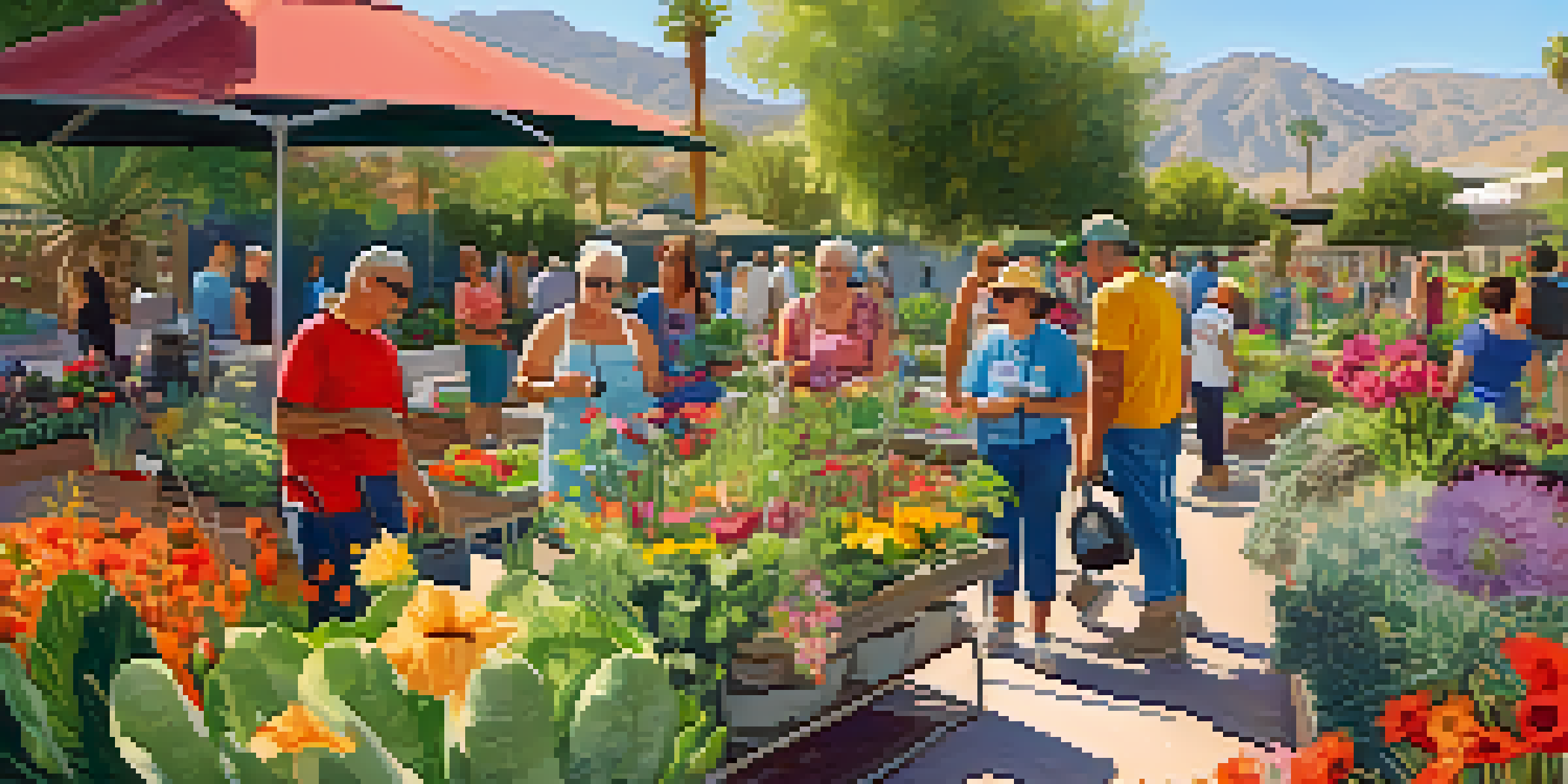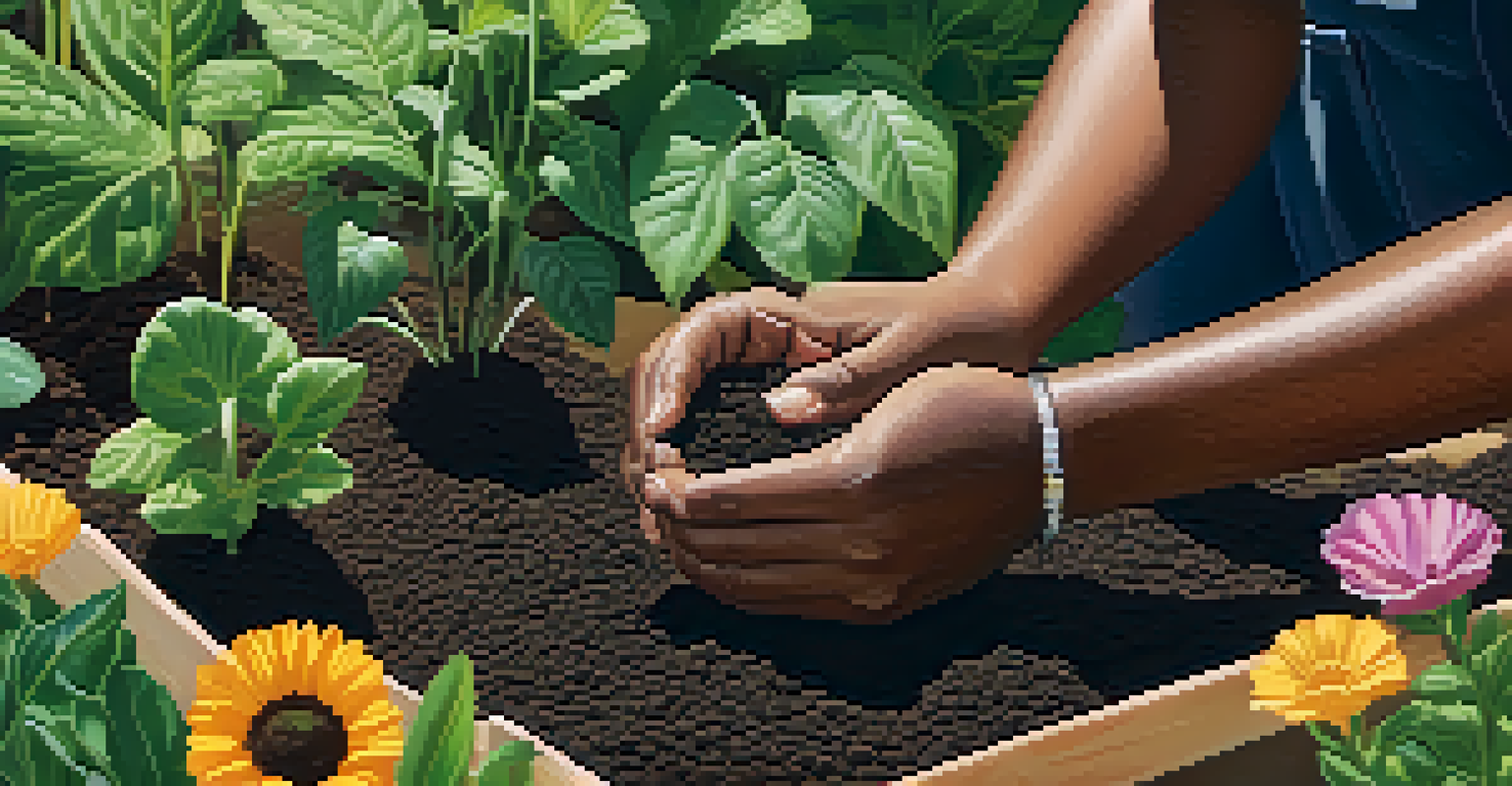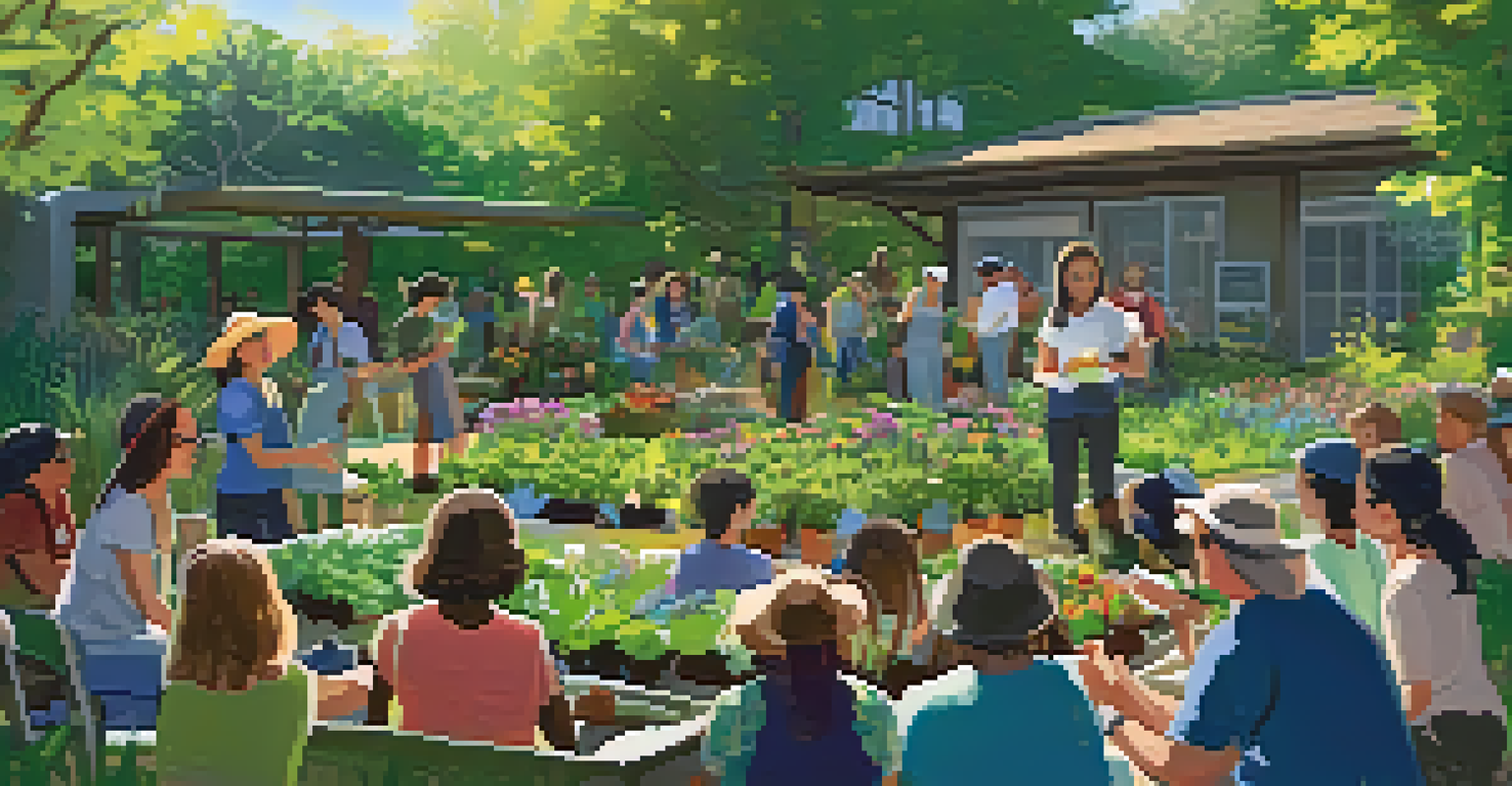Exploring the Benefits of Community Gardening in Palm Springs

Fostering Community Connections Through Gardening
Community gardening is more than just planting seeds; it's about cultivating relationships. In Palm Springs, these gardens serve as communal spaces where neighbors can connect, share stories, and collaborate on projects. Imagine a sunny afternoon where families gather to tend their plots, exchanging gardening tips and laughter.
To plant a garden is to believe in tomorrow.
These interactions help build a sense of belonging, making residents feel more connected to their community. Over time, as people work together, friendships blossom, transforming strangers into neighbors. This camaraderie is vital, especially in a place where social connections can sometimes feel fleeting.
Ultimately, community gardening creates a network of support among participants. This not only enhances the gardening experience but also fosters a more vibrant, engaged community. When people feel connected, they are more likely to participate in other local initiatives, further enriching the Palm Springs community.
Enhancing Physical and Mental Well-Being
Gardening offers a dual benefit: it promotes physical activity while also boosting mental health. For residents of Palm Springs, digging in the soil can be a great way to get some exercise in the fresh air. Activities like planting, weeding, and watering not only burn calories but also keep the body active and healthy.

On the mental health front, community gardens provide a peaceful escape from the hustle and bustle of everyday life. Spending time outdoors, surrounded by nature, has been shown to reduce stress and anxiety, offering a much-needed respite. Participants often report feeling rejuvenated after a few hours spent tending to their plants.
Community Gardens Foster Connections
These gardens create a sense of belonging by bringing neighbors together to collaborate and share experiences.
Moreover, nurturing plants can instill a sense of purpose and accomplishment. Watching seeds grow into thriving vegetables or flowers can boost self-esteem and inspire creativity. This combination of physical and mental rewards makes community gardening a holistic approach to wellness.
Promoting Sustainable Practices and Local Food Production
Community gardening is a powerful tool for promoting sustainability. In Palm Springs, these gardens encourage practices like composting and organic gardening, which reduce waste and support healthier ecosystems. By working together, gardeners can share knowledge about eco-friendly techniques that benefit both their plots and the environment.
Gardening adds years to your life and life to your years.
Furthermore, community gardens provide a source of fresh produce, helping to combat food deserts in urban areas. Participants can enjoy the satisfaction of growing their own fruits and vegetables, which are often more nutritious than store-bought options. This not only enhances their diets but also fosters a sense of food security.
Through these gardens, residents learn about the importance of food sovereignty and the benefits of eating locally. As they cultivate their own food, they develop a deeper appreciation for where their meals come from, often leading to healthier eating habits. Community gardening thus plays a crucial role in strengthening local food systems.
Encouraging Environmental Awareness and Education
Community gardens serve as living classrooms, providing invaluable education on environmental stewardship. In Palm Springs, gardeners often engage in workshops that teach sustainable practices such as water conservation, soil health, and native plant cultivation. This hands-on learning fosters a deeper understanding of ecological principles.
Children and adults alike benefit from these educational opportunities. Families can bond over learning about the importance of biodiversity and the role of pollinators in our ecosystem. Such experiences nurture a sense of responsibility towards the environment, encouraging participants to adopt eco-friendly practices in their own lives.
Gardening Boosts Well-Being
Engaging in gardening promotes both physical activity and mental health benefits, providing a holistic approach to wellness.
As awareness spreads, community gardens also promote advocacy for environmental issues. Participants often unite to address local challenges, such as water conservation in a desert climate. Through these collaborative efforts, they can make a meaningful impact both locally and beyond.
Creating Beautiful and Functional Green Spaces
Community gardens add aesthetic value to neighborhoods, transforming underutilized spaces into vibrant green areas. In Palm Springs, these gardens become colorful oases, attracting pollinators and enhancing the overall beauty of the community. The visual appeal of these spaces encourages more residents to engage with their surroundings.
Beyond beauty, these gardens serve practical purposes as well. They can help reduce urban heat by providing shade and cooling the surrounding area. This is particularly important in Palm Springs, where summer temperatures can soar, making green spaces essential for community comfort.
Moreover, well-maintained gardens can increase property value and draw visitors to the area. Community gardens can become a focal point for local events, attracting people who want to enjoy the beauty and benefits of nature. This creates a positive cycle of engagement that further enhances the community.
Building Resilience Through Shared Resources
One of the core benefits of community gardening is the pooling of resources. In Palm Springs, gardeners often share tools, seeds, and expertise, making gardening accessible to everyone. This collaborative spirit not only reduces individual costs but also fosters a sense of teamwork among participants.
Sharing resources can help mitigate challenges faced by individual gardeners, such as pest control or soil quality. Experienced gardeners can guide newcomers, ensuring that everyone has the support they need to thrive. This mentorship creates a nurturing environment where knowledge is passed down, enhancing the overall gardening experience.
Sustainable Practices Through Gardening
Community gardens encourage eco-friendly techniques and local food production, enhancing sustainability in the community.
As community members band together, they build resilience against external pressures, such as climate change or economic downturns. By relying on each other, they can adapt to changing circumstances and continue to cultivate their gardens. This shared strength emphasizes the power of community in overcoming obstacles.
A Catalyst for Community Events and Activities
Community gardens often serve as vibrant hubs for local events and activities. In Palm Springs, these spaces host everything from potlucks to workshops, bringing people together to celebrate their shared passion for gardening. Such events foster a sense of unity and create opportunities for fun and learning.
These gatherings not only strengthen bonds within the community but also attract newcomers. When people see the lively activities happening in these gardens, they are encouraged to participate, creating a welcoming atmosphere. This inclusivity is essential for ensuring that the garden remains a focal point for community engagement.

Additionally, events in community gardens can raise awareness about important social and environmental issues. By hosting discussions or film screenings, these gardens can spark conversations that lead to positive change. In this way, community gardens become catalysts for both personal and communal growth.
Embracing Diversity and Inclusion in Gardening
Community gardening in Palm Springs reflects the rich diversity of the area. These gardens welcome individuals from all backgrounds, creating a space where everyone can contribute and learn from one another. This inclusivity fosters a sense of belonging that is vital for social harmony.
Participants often bring their unique gardening traditions and cultural knowledge, enriching the overall gardening experience. Imagine the variety of plants that can thrive in a community garden, each representing a different heritage or culinary tradition. This diversity not only enhances the garden's beauty but also broadens the culinary options for participants.
Moreover, inclusive community gardening promotes understanding and respect among neighbors. As participants collaborate, they learn about each other's cultures, fostering empathy and connection. This shared experience helps to bridge divides and create a more cohesive community.